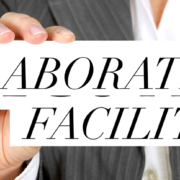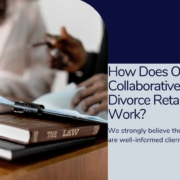Collaborative Divorce
Divorce is a trauma. It is tough not only for the spouses who are separating, but also for their children, their friends, their relatives, and their community. If you can avoid divorce, whether by seeking help from a therapist or clergy, you should attempt to do so. However, sometimes a marriage is truly irretrievably broken.

For those who are going through divorce, there is an alternative to the “War of the Roses” or “Kramer vs. Kramer” scenario where countless dollars are spent on attorney and expert witness fees, families are torn apart, and bridges are completely burned. In most cases, the single best alternative in this attorney’s view (and in the view of a growing number of mental health professionals) is collaborative divorce.
Collaborative divorce is a form of dispute resolution where the family agrees from the very beginning that they are not going to use attorneys to fight against one another in court. Unlike in traditional divorce, each spouse will have an attorney who will focus solely on helping the family reach an agreement that is acceptable to everyone. In fact, the spouses each sign a “participation agreement” which contractually bars the collaborative attorneys from engaging in poisonous litigation (if a party wants to engage in a court battle, he or she cannot use the collaborative lawyer to do so).
No money will be wasted on opposition research, depositions, or costly trial preparation. No embarrassing revelations or trade secrets will be revealed in a public court setting or remain in the public court record. Instead, the two spouses and two attorneys will work as a team to constructively restructure the family in a private, confidential setting.
To help the spouses look to the future and focus on what is most important (for example, the children) rather than the arguments of the past, a neutral facilitator with a mental health licensure is oftentimes brought in. The facilitator ensures that communication remains respectful during meetings and can even help the spouses learn effective communication and dispute resolution techniques to help them co-parent once the divorce is granted. This is also in recognition that the most difficult issues in divorce are usually not legal; they are emotion-based.
Additionally, a neutral financial professional is frequently retained to help ensure there is complete financial disclosure and transparency between the spouse (i.e., trust but verify) so that each person will have informed consent prior to signing a marital settlement agreement. The financial professional efficiently drafts both parties’ financial affidavit (financial affidavits are a requirement under Florida law which is usually done by each party’s attorney at two high attorney rates). The financial professional also provides tailored options when determining support issues and how assets and debts will be divided.
In sum, if you can save your marriage, please try. But if you must get divorced, you can spare your family a lot of pain by doing it through the collaborative divorce process.
If you have questions regarding collaborative divorce and you wish to speak with a trained Collaborative Attorney, contact Family Diplomacy: A Collaborative Law Firm at (813) 443-0615 or by filling out our consultation form.
Attorney Adam B. Cordover is president of Next Generation Divorce, Florida’s largest collaborative practice group, and a graduate of the inaugural class of the Leadership Academy of the International Academy of Collaborative Professionals.
Adam B. Cordover is managing attorney of Family Diplomacy: A Collaborative Law Firm and now practices exclusively in out-of-court dispute resolution.





Leave a Reply
Want to join the discussion?Feel free to contribute!